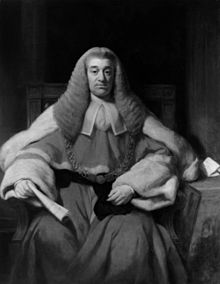Nicholas Conyngham Tindal
| Nicholas Conyngham Tindal | |
|---|---|

Portrait of Sir Nicholas Conyngham Tindal by Sir Thomas Phillips RA, now in the Great Hall of Lincoln's Inn.
|
|
| Born |
12 December 1776 Moulsham, Chelmsford, England |
| Died | 6 July 1846 (aged 69) |
| Monuments |
|
| Nationality | English |
| Education | King Edward VI Grammar School (Chelmsford) |
| Alma mater | Trinity College, Cambridge |
| Occupation | |
| Known for |
|
| Relatives | Nicolas Tindal (great-grandfather), Matthew Tindal (great great grand-uncle), Adela Maddison, grand-daughter, Reginald Bosanquet (great great grandson) |
Sir Nicholas Conyngham Tindal, PC (12 December 1776 – 6 July 1846) was a celebrated English lawyer who successfully defended the then Queen of the United Kingdom, Caroline of Brunswick, at her trial for adultery in 1820. As Chief Justice of Common Pleas, an office he held with distinction from 1829 to 1846, he was responsible for the inception of the special verdict "Not Guilty by reason of insanity" at the trial of Daniel M'Naghten.
Judge Tindal was born in the Moulsham area of Chelmsford, where 199 Moulsham Street is today, and the site is marked with a commemorative plaque.
Tindal's father, Robert Tindal, was an attorney in Chelmsford, where his family had lived at Coval Hall for three generations. His great-grandfather, Nicolas Tindal, was the translator and continuer of the History of England by Paul de Rapin – a seminal work in its day – and he was also the great great grandnephew of Matthew Tindal, the deist and author of 'Christianity as Old as the Creation' (known as the 'deist's bible') and descendant of Thomas Clifford, 1st Baron Clifford of Chudleigh.
Nicholas's branch of the Tindal family were descended from John Tindal, Rector of Bere Ferris in Devon during the Commonwealth of England and who has been claimed as the son either of Dean Tyndall or of (his father) John Tyndall, both of Mapplestead, Essex. John Nichols, in the 18th century, set out a genealogy maintaining that the family derived from Baron Adam de Tyndale of Langley Castle, Northumberland, a tenant-in-chief of Henry II, though this has been challenged Through this line, Tindal would have been collaterally descended from William Tyndale, translator of the bible.
...
Wikipedia
